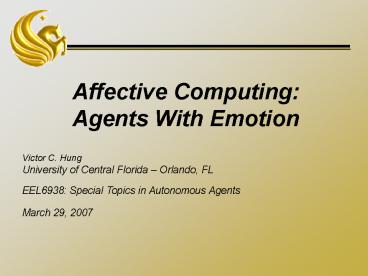Affective Computing: Agents With Emotion - PowerPoint PPT Presentation
1 / 22
Title:
Affective Computing: Agents With Emotion
Description:
University of Central Florida Orlando, FL. EEL6938: Special Topics in ... affective systems such as Seeking (Wanting), Fear, Rage, and other circuits ... – PowerPoint PPT presentation
Number of Views:339
Avg rating:3.0/5.0
Title: Affective Computing: Agents With Emotion
1
Affective Computing Agents With Emotion
Victor C. Hung University of Central Florida
Orlando, FL EEL6938 Special Topics in
Autonomous Agents March 29, 2007
2
Agenda
- Introduction
- Highlighted Projects
- Affective Cognitive Learning Decision Making
- Questions
3
Introduction
- Affective Computing relates to, arises from, or
deliberately influences emotion or other
affective phenomena - Engineering, computer science with psychology,
cognitive science, neuroscience, sociology,
education, psychophysiology, ethics - Emotion is fundamental to human experience
- Cognition
- Perception
- Learning
- Communication
- Rational decision-making
4
Introduction
- Technologists have largely ignored emotion
- Affect has been misunderstood
- Hard to measure
- MIT Media Lab Affective Computing
- http//affect.media.mit.edu
- Develop new technologies and theories
- Understanding affect and its role in human
experience - Restore a proper balance between emotion and
cognition in the design of technologies for
addressing human needs
5
Introduction
- Issues in affective computing
- Communication of affective-cognitive states to
machines - Techniques to assess frustration, stress, and
mood indirectly - Make computers can be more emotionally
intelligent - Personal technologies for improving
self-awareness of affective states - Emotions influences personal health
- Ethics
6
Highlighted Projects
- Affective-Cognitive Framework for Machine
Learning and Decision-Making - Emotions role in learning and decision making
- Digital Story Explication as it Relates to
Emotional Needs and Learning - Emotional interaction in child learning
- ESP - The Emotional-Social Intelligence
Prosthesis - Aid for the emotionally-impaired
7
Highlighted Projects
- Fostering Affect Awareness and Regulation in
Learning - Combat frustration during the learning process
- Machine Learning and Pattern Recognition with
Multiple Modalities - Emotional sensor data fusion
- Ripley A Conversational Robot
- Human-robot interaction platform through language
and visual perception modalities
8
Affective-Cognitive Learning Decision Making
- (2006) Ahn and Picards Affective-Cognitive
Learning and Decision Making The Role of
Emotions, The 18th European Meeting on
Cybernetics and Systems Research - Framework for learning and decision making
- Inspired by neural basis of motivations and the
role of emotions in human behavior - Affective biases
- Loss aversion
- Effect of mood on decision making
9
Affective-Cognitive Learning Decision Making
- Affective biases
- Two-armed bandit
10
Affective-Cognitive Learning Decision Making
- Loss aversion
- Prefer avoiding losses than acquiring gains
11
Affective-Cognitive Learning Decision Making
- Effect of mood on decision making
ANGER Optimism about the future
HAPPINESS Optimism about the present
Pessimism about the future FEAR
Pessimism about the present SADNESS
12
Affective-Cognitive Learning Decision Making
- A motivational value (reward)-based learning
theory - Extrinsic value from the cognitive (deliberative
and analytic) systems - Intrinsic value from multiple affective systems
such as Seeking (Wanting), Fear, Rage, and other
circuits - Probabilistic models
- Cognition (cognitive state transition)
- Multiple affect circuits (Seeking, Joy, Anger,
Fear, ...) - Decision making model
- Previous knowledge can be incorporated for
expecting the consequences of decisions (or
computing the cognitive value)
13
Affective-Cognitive Learning Decision Making
14
Affective-Cognitive Learning Decision Making
- The Decision-Making Model
- Cognitive state (c)
- Affective state (a)
- Decision (d)
15
Affective-Cognitive Learning Decision Making
- Affective seeking value
- Valence decided by the mean of the filtered
values for the reward samples - Arousal uncertainty of the reward sample
distribution (modeled as standard deviation) - Complete decision-making expression
- Non-affect agent has only the cognitive component
16
Affective-Cognitive Learning Decision Making
- Affective agent vs. Non-affect agent
17
Affective-Cognitive Learning Decision Making
- Influence of an outlier on the cognitive values
and the valence values
18
Affective-Cognitive Learning Decision Making
- Affective component less sensitive to outliers
than cognitive component - Affective Cooling Agreement between two
components - More likely to follow the decision by the
cognitive component (Exploitation) - Value of the induced inverse temperature
parameter increases - Humans using cognition in decision-making
- Affective Heating Conflict between two
components - Less likely to follow the decision by the
cognitive component (Exploration) - Value of the induced inverse temperature
parameter decreases - Humans depending on emotion in decision-making
19
Affective-Cognitive Learning Decision Making
- 10-armed bandit tasks
20
Affective-Cognitive Learning Decision Making
- Too much or too little affect impairs learning
- Excessive learns faster, but not good for
long-term - Insufficient better for long-term, but slow
21
Affective-Cognitive Learning Decision Making
- Results and Conclusions
- Framework enhancements
- Model other affect circuits
- Incidental influences on decision making
- Use of prior knowledge for expecting cognitive
outcomes ? - Affective bias
- Helps automatically regulate exploration and
exploitation - Speed up learning without sacrificing decision
quality - This framework might mimic well-studied human
behavior - Risk aversion
- Effects of mood on decision making
- Self-control
22
Questions?































